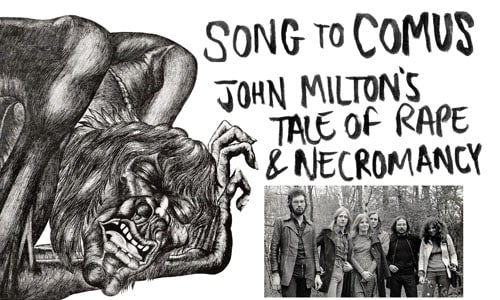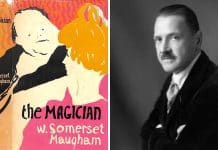DOM COOPER describes how the great English poet John Milton sought to cleanse a family’s honour through song
A guitar is hit hard and strummed with abandon, another is plucked and joined by a flute, the demented voice of Roger Wootton breaks in to sing:
“Bright the sunlight summer day, Comus wakes he starts to play. Virgin fair smiles so sweet, Comus’ heart begins to beat’. Each of the ending words are echoed out in repeat, ‘… play, play, play, play …”
The song continues on to tell a form of the Comus story, based on John Milton’s masque of the same name, in which he ensnares a lady in a forest. “Comus glare, Comus bare, Comus rape”.
In 1630 a heinous charge of sodomy and rape was brought upon the head of the Earl of Castlehaven, who was tried and convicted of sodomy with his page, and accused of provoking and assisting another to rape his wife – part of a twisted plan to produce an alternate heir. Described by the judge as an ‘unnatural crime’, he was found guilty and beheaded three weeks later on Tower Hill.
Four years after this event, his brother-in-law John Egerton, the 1st Earl of Bridewater, arrived at Ludlow castle to take up his new appointment as Lord President of Wales. To celebrate the occasion, the poet John Milton wrote a masque, named ‘Comus’. It is said that the masque was performed to cleanse the family’s past and to help forget the crimes of the Earl of Castlehaven.
“It is said that the masque was performed to cleanse the family’s past and to help forget the crimes of the Earl of Castlehaven.”
John Milton (born in 1608), worked as a civil servant under Oliver Cromwell, and was a renowned poet and scholar, best known for his epic poem ‘Paradise Lost’, that ruminates on the temptation of Adam and Eve by the fallen angel Satan.
His masque ‘Comus’ tells the story of two brothers and a sister who find themselves lost in a forest. When the sister, known as the Lady, stops to rest, her brothers search on for food. Comus then appears to her, a kind of god of chaos based on the Greek god of the same name, disguised as a villager. He tricks and captures her, and takes her to his pleasure palace, putting her on a bewitched chair where he uses a necromancers wand and entices her to drink from his magical cup. She refuses in the name of chastity and temperance.
Eventually she is rescued by her brothers with help from The Attendant Spirit, a kind of angel. Who manage to chase Comus away, but they can’t free their sister from the chairs spell. The Spirit gives them aid by calling the water nymph Sabrina with a song, who subsequently frees the Lady. The three siblings return home to be reunited with their parents in jubilation.

‘Song to Comus’ uses the middle part of the poem, where the demon finds the Lady in the forest, as its basis. Roger Wootton sings wildly with glee as he enacts Comus, ‘… hands of steel, crack you open and your red flesh peel …’ The band ramp up the darkness with theatre, as they do with on most of the songs on their unique debut ‘First Utterance’.
Comus formed tentatively in 1967 with the meeting of guitarists Roger Wootton and Glenn Goring at Ravensbourne college. During that period they started to play folk clubs together and later met David Bowie at the Arts Lab in Beckenham, who then asked them to perform regularly at his curated evenings.
They met their manager Chris Youle at the college, as well as a violinist, Colin Pearson, who was studying Milton at the time and suggested the band name. The bass player Andy Hellaby was found at the Arts Lab, and singer Bobbie Watson was invited to join after the rest of the band heard her harmonising at a local house. Flautist Rob Young was found through an advert.
In 1970 they toured and played across the country like any other working band. During that year, Canadian director Lindsay Shonteff asked them to contribute to her film ‘Permissive’, a story of groupies in London. Shonteff had been impressed by a gig at which Roger cut his hand and continued to play on, bleeding on to his guitar during the song ‘Drip Drip’. Various members of Comus went on to score another three films for Shonteff, who’s ‘Permissive’ is part of the BFI flipside collection.
In June of the same year, the band performed at the Purcell Rooms in London’s Royal Festival Hall supporting David Bowie. Their mesmerising and frenetic act brought them much attention and led them to ink a contract with label Pye/Dawn.
The following year they released ‘First Utterance’, with its cover depicting Comus in all his evil glory, drawn by Roger himself. Unfortunately the album had no commercial success and they disbanded in ’72.
On ‘Song to Comus’ the intensity of the rest of the album is continued. ‘First Utterance’ really is a one of a kind – bizarre compelling vocals by Roger, lush foil-vocals from Bobbie, urgent guitars, apocalyptic violin playing, head nodding percussion and a burrowing flute.
Roger sings the final fading lines, ‘He starts to play, he starts to play, he starts to play’. We all know by now how Comus likes to play.







